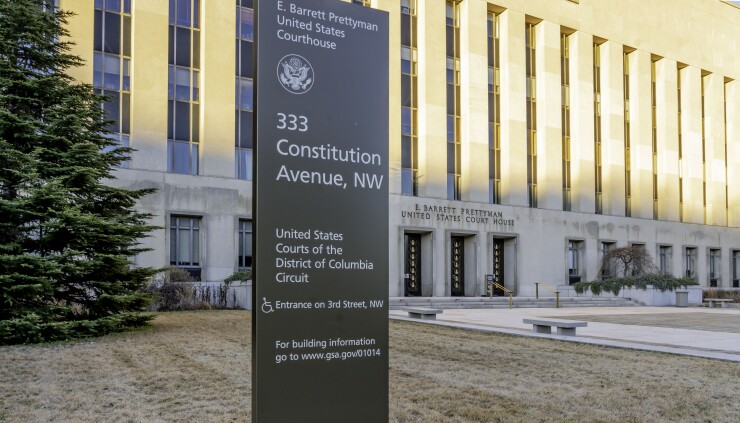A federal appeals court has scheduled oral argument in the Securities Industry and Financial Markets Association's lawsuit challenging the legality of a temporary Securities and Exchange Commission exemption for municipal advisors during the height of the pandemic.
The U.S. Court of Appeals for the D.C. circuit is scheduled to hear that oral argument Oct. 22. At stake in the court’s decision, from SIFMA’s perspective, is the ability of the SEC to provide future exemptions like the 2020 Temporary Conditional Exemption (TCE) that excused from broker-dealer registration municipal advisors arranging particular transactions between their municipal issuer clients and financial institutions. The TCE expired at the end of December 2020, but SIFMA persisted in the
While the court can change the date of the oral argument, it will remain the morning of Oct. 22 absent further order of the court, according to a recent filing. SIFMA confirmed the date as well, but declined to offer further comment.

The SEC presented the TCE as a measure to “designed to aid smaller municipal issuers that may be struggling to meet their unexpected financing needs in light of the COVID-19 pandemic,” and the move found favor with municipal advisors and many issuer officials. The SEC had previously floated a proposal to provide a similar exemption, but chose not to move forward with it after soliciting public comment in October 2019.
While the TCE was limited in scope, dealer groups including SIFMA complained the order was not as narrow as its proponents claimed. Some of the conditions applied to the temporary exemption included capping the size of the direct placement deal at $20 million, and a requirement that the debt must be issued in denominations of $100,000 or more. Under the TCE, MAs were allowed to solicit such transactions to banks, their wholly owned subsidiaries that are engaged in commercial lending and financing activities, and credit unions.
SIFMA said the SEC’s actions failed to follow regulatory procedure and unjustly disadvantaged registered dealers for the benefit of firms registered only as muni advisors.
In a January brief, the SEC said the TCE was created to complement the Federal Reserve’s Municipal Liquidity Facility, which also expired on Dec. 31, 2021. The issue is now moot, the SEC told the court.
SIFMA, meanwhile, continues to believe the suit has merit because the SEC could conceivably revive the TCE in the future.
Oral argument will be in front of a three-judge panel, with each side allotted a certain amount of time to present its case. The panel typically questions attorneys for both sides, but the judges make their decision later in closed-door sessions. Appellate court decisions are appealable to the Supreme Court.





